Harmony: The Fall of Reverie review
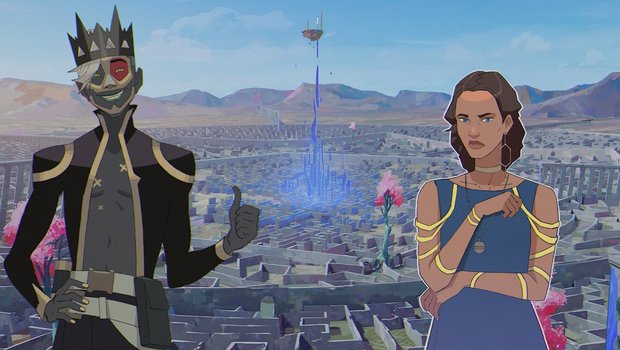
- 0 Comments
Storytelling elements aren’t quite attuned in Don’t Nod’s lovely visual novel
It feels like the world is at a crucial inflection point. At a time when shared global challenges have never been more critical, mankind seems as divided now as it’s ever been – between East and West, between right and left, between rich and poor, among the many other fundamental fractures pulling us apart. So too is the world of Harmony: The Fall of Reverie. Or rather, the two worlds of Don’t Nod’s unique narrative adventure with a little strategic twist. The story is as ambitious as it is timely, weaving together elements of family drama, spiritualism, (potential) romance, social and economic injustices, and an existential question of what kind of world we should be. It’s a shame, then, that its reach largely exceeds its grasp. The presentation is gorgeous but far too limited to effectively convey the weight of a dual-reality narrative that relies far too much on telling rather than showing, and the experimental choice mechanic meant to stand out from other visual novels ends up feeling largely counterproductive. The end result is a game with its heart very much in the right place but hindered by its own disharmonious imbalances.
Players control a young woman named Polly, who returns to her Mediterranean home island of Atina after many years away following the unexplained disappearance of her mother Ursula, with whom she’s always had an icy, distant relationship. Polly grew up with close family friends in the Naiads, a gathering place for artists in the quaint, historic district of Alma, within sight of the towering modern highrises controlled by the technologically advanced megacorporation Mono Konzern (MK), which now controls most of the businesses (and therefore citizens) in the city. All is not well on Atina, however, as protests have begun occurring over MK’s oppressive methods and outsized influence that benefits the few at the expense of the many.
Unbeknownst to Polly, the strife occurring all over the world is impacting the hidden, intangible realm of Reverie, a place outside of time and space that’s inhabited by six Aspirations. Neither good nor evil, these immortal beings are singular representations of mankind’s flawed psyches. They are “incarnations of humanity’s yearnings, desires and intelligences” who are able to act like Muses by influencing the people on Brittle (their accurate if a little on-the-nose name for the material world) through dreams and inspiration, never directly. Due to the symbiotic relationship between Brittle and Reverie, the “heart” at the center of Reverie is now dying and in need of a new leader from among the Aspirations. However, the only person who can choose one is an Oracle – a special human born once per age to restore balance on and between both realms.
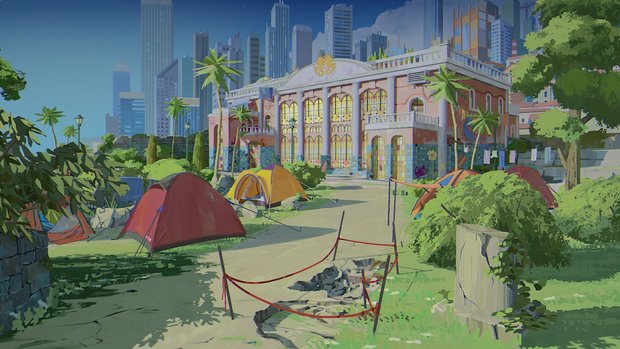
Wouldn’t you know, the new chosen one is none other than Polly (whom the Aspirations refer to as Harmony), who suddenly finds herself swept into the otherworldly Nexus to learn of her fate. It turns out that one of the Aspirations has fallen in with MK – a major no-no – thus creating a greater crisis than ever for both worlds. While adding to the stakes, this doesn’t fundamentally alter Polly’s immediate tasks, as it all seems tied somehow to Ursula’s disappearance. Her goal is to continue to foster good relations with those she reconnects with on Atina while attempting to discover what happened to her mother, all while the various Aspirations (essentially) chirp in her ear about how to handle any “ruthless, difficult, even painful” decisions she has to make.
If all that background seems excessively expositional, you ain’t seen nuthin’ yet, because that’s exactly what the vast majority of Harmony consists of. The developer’s acclaimed Life Is Strange series is fairly light on gameplay, but here they’ve practically eschewed it altogether. There’s no free movement, no exploration, no environmental interaction, no puzzles, just a pure visual novel to click through – and rarely even that if you choose to let the text autoplay instead of doing so manually. This isn’t necessarily a bad thing by any means. There’s a meaty story to unpack, a lot of world-building background lore to uncover (the most pertinent details recorded in a Codex for handy reference), and some really thoughtful characterizations for the wildly eclectic cast of people you meet.
Among the humans, highlights include Polly’s best friend Nora, who’s still coming to terms with different aspects of her identity; the gruff but fatherly soft-inside Laszlo, who cares deeply for the girls and has always held an unrequited flame for Ursula; and the young but already worn-down activist leader Jade. If you’re up for a little flirting even as two worlds threaten to collapse around you (hey, the heart wants what the heart wants), the nongendered Yana is never farther than a holographic phone call away. The Aspirations are the real characters, here, however, from the childlike, pigtailed, happiness-craving Bliss; to the kindly and community-driven Bond, who never stops playing a Cat’s Cradle-like string game with his hands; to the ever-mercurial Chaos, the crowned free spirit with enormous power to spark change who covets only the pleasures of the here and now, consequences be damned.
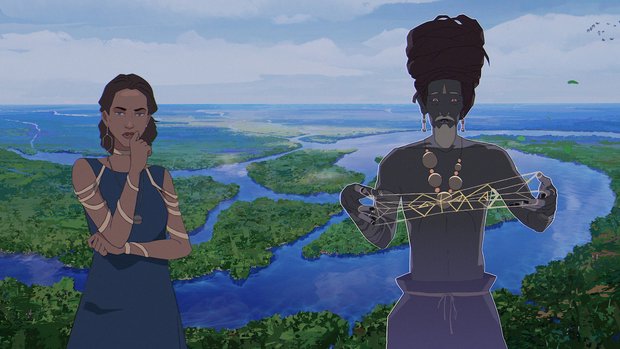
The writers have done a great job of giving the characters nuanced personas that make them feel like real, multilayered people, but at times it can be both too much and not enough. On many occasions the story can become bogged down in dealing with people’s personal issues rather than getting on with more important things, while on the other hand there are so many people jostling for morsels of attention that some of them slip too far into the background for long stretches depending on your choices. Yes, replays can help fill in some of the blanks, but even then it’s never entirely in your control. The flipside to all the character development is that when the story finally does kick into high gear, great swaths of significant, life-altering plot are cut through with just a few blink-and-you-miss-them lines.
The game (wrongly) thinks it can get away with doing so because it turns the accepted “show don’t tell” principle of storytelling on its head. There are a few cutscenes of major events involving the Aspirations, but few or none involving the mere mortals on Brittle, which is where the most significant action (supposedly) takes place. It’s noticeable even in small ways: I lost track of how many times Polly’s monologue text described a hug exchanged with her counterpart at the time, while the visible character portraits are clearly doing no such thing! But it’s a really big deal when tense break-ins and violent protests are glossed over without so much as an altered background image to convey them before getting back to the next “how do we all feel about things?” introspection sequence.
Of course, how the story plays out – to an extent – and whom you choose to most closely align yourself with on both worlds depends on the choices you make along the way. Here is where Harmony tries to distinguish itself from its visual novel contemporaries … and largely pooches it. Oh, it distinguishes itself, all right, and I applaud any effort to try something different, but it’s hard to consider this particular attempt to be anything but a failed experiment. Instead of simply letting players choose from available on-screen options, Don’t Nod leans into the “Oracle” theme by introducing the Augural, a kind of flowchart filled with branching story nodes, where you can theoretically scout ahead to see into the future and thereby plan a strategy for your decisions ahead of time. If that sounds a bit dodgy, well, as one of the Aspirations themselves admits, “Try not to think about it too much. Even the gods of this place don’t know how it works.”
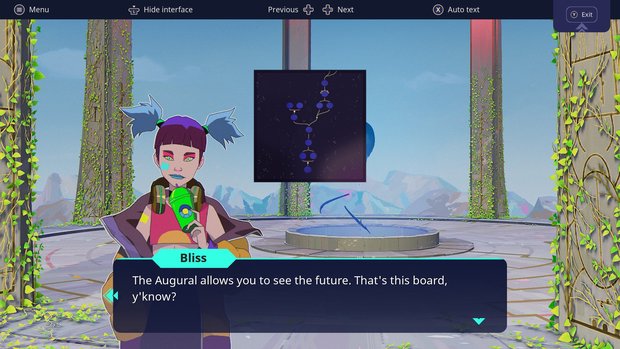
I did think about it, though, and my first objection is perhaps a personally philosophical one: To me the joy of choice-based narrative adventures is in NOT knowing how your decisions will impact the future. The agony of wrestling over limited options without certainty of the repercussions is what gives the struggle its emotional heft. Remove that and you’re really just gaming the system – in this case literally. But it doesn’t work well on a more practical level either. The Augural is nothing to look at – a plain background with a bunch of connected circles and brief text for each decision – and you’re constantly being ripped out of the beautifully illustrated actual story and forced to clumsily navigate (via keyboard or gamepad) this unappealing screen just to decide your next move. It feels more like consulting an instruction manual for how to build an otherwise engaging story every step of the way. How is that fun?
Even if you’re okay with tailoring your decisions to a predetermined outcome, I rarely found the Augural’s descriptions all that insightful. As the game itself explains it, Polly/Harmony is given “glimpses” of the future, and yet large parts of it remain hidden from her. And that is indeed the case. Whenever I dutifully but tediously bothered to try mapping out a plan ahead, I inevitably realized that nothing the chart let me foresee was of any real use anyway. Then there’s the completely pointless, overcomplicated layer of crystals known as “egregore” that can improve or penalize your standing with certain Aspirations. Fail to have enough of a particular Aspiration’s crystal and your avenues for pursuing their preferred course of action is cut off.
Again, this makes sense on paper, but it really just makes the process even less enjoyable to plan around. This is meant to be a heartfelt story with characters you feel invested in, not a management sim or a strategy war game whose pieces you move around a game board like a detached general. If I want to show compassion or tough love to Person X, I’ll do it because I feel they need it or because it best suits my emotional state in that moment, not because it will curry an ounce of favour with Godlike Being Y, which may or may not benefit a desired outcome somewhere down the line. Eventually I made the most important decision of all – to just ignore trying to peer into the frustratingly hazy future and stick with making the immediate choices I believed in. Which is precisely what any visual novel offers, but without the never-ending hassle of being yanked out to a separate screen every time you have to make a choice, sometimes even for things as basic as getting out of bed.
Really, when a game looks as nice as Harmony, you wonder why the developers would ever want to divert attention from their hand-painted artwork. It really is beautiful outside the Augural, but it’s so, so limited. There can’t be more than a couple dozen screens in both realms combined, whether the sandy beaches, the graffiti-plastered skatepark, or the grassy front courtyard of the stained-glass Naiads residence on Brittle, or Bliss’s giant Easter egg home filled with toys, Bond’s marshy camp at the base of a giant mangrove forest, or the disco-decorated pyramid of the flamboyant Glory in Reverie. If only there had been more of them! Every time a new (very brief) load screen would usher me back from the Augural, I prayed for an image I hadn’t yet seen countless times already, but rarely did it happen. Character models are equally stylish and appropriate, partially animated with different poses and expressions that look authentic, such as Polly’s sheepish habit of using an arm to grab onto her opposite shoulder in conversation.
The voice-overs couldn’t have been better cast, each actor perfectly portraying their character exactly as I’d have imagined them. Music is pleasant enough but rather nondescript, more so the synthesized New Agey backdrops in the game’s first half, which give way to better mood-setting instrumentals as the story begins to grow darker and more poignant. Unfortunately the sound effects suffer from serious limitations as well. The few ambient sounds that play are appropriate when things are calm, but they don’t keep up with described events when the action heats up. A report of violent protests nearby shouldn’t continue to sound like the same peaceful day in the park.
I completed Harmony once in its entirety, taking a little over five hours to reach a rather dramatic ending that left me wondering whether my choices really mattered all that much all along. I did replay the first couple chapters to see how different choices played out, but having started over completely from the beginning, I simply wasn’t motivated to see it all the way through a second time. (You can restart your current chapter, but not return to a previous one once your save file has been overwritten.) To the game’s credit, at least the choices do actually require some thought and internal debate. Many are small and personal while others are much more important – perhaps even a matter of life and death – though the overall story continues along the same track either way. They’re never particularly rewarding since you rarely experience the consequences first-hand, but at least the responses don’t fall into the Telltale trap of causing predictable division within the ranks. There’s no unnecessary reminder that you’ve offended one camp by allying with another, and no stats comparing other players’ choices. This is your story, and there’s no right or wrong, just different ways to approach it.
Final Verdict
I’m certainly not sorry I played Harmony: The Fall of Reverie, but I honestly can’t say it worked for me either. It asks some important and thought-provoking questions, and beautifully lays the groundwork for a potentially interesting adventure, but by focusing exclusively on character interactions and removing the decision-making process from the in-game environments, it ultimately feels more like a story about a story, rather than one you’re living through personally. It reminded me of the 2014 Godzilla reboot – not because it has giant rampaging monsters (it doesn’t), but in the way it was filmed so that all the best action seemed to be happening in the background or even off-screen entirely. Ideally I’d have preferred to see at least a Life Is Strange level of gameplay here, but even as a pure visual novel, the pieces just don’t fit well. I’d gladly watch a Brittle/Reverie animated television series that fleshes out both worlds and characters to a much greater extent, but if I had an Augural of my own to see into the future, I’d definitely be choosing the option that ensures we never see this particular mechanic again.
Hot take
Don’t Nod’s visual novel Harmony is an awkwardly balanced mix of gorgeous but limited production values, clumsy choice mechanic, and an intriguing story whose best parts you never get to experience yourself.
Pros
- Beautiful hand-drawn artwork
- Diverse, well-written characters with pitch-perfect voice-overs
- Ambitious, timely story is thought-provoking and fittingly aspirational
Cons
- Presentation heavily slanted to telling, not showing
- Detached decision-making mechanic feels largely pointless and distracting
- Plot and cast are too ambitious to do them proper justice
Jack played Harmony: The Fall of Reverie on PC using a review code provided by the game's publisher.




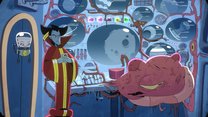


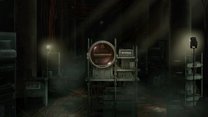


0 Comments
Want to join the discussion? Leave a comment as guest, sign in or register in our forums.
Leave a comment